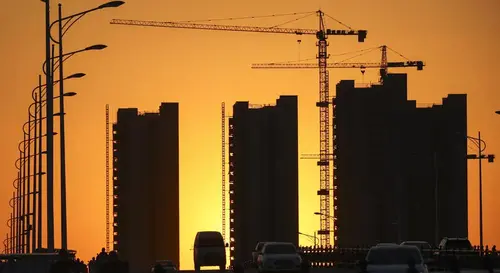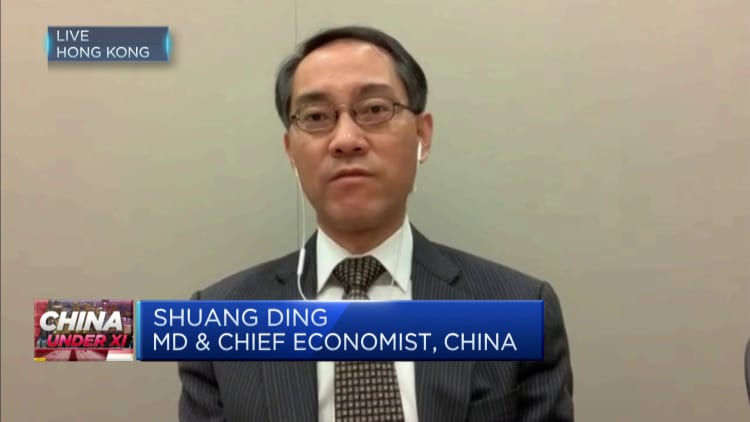
Why China won't bail out its real estate sector
BEIJING — China's central government is not likely to spend billions to save the struggling real estate sector, even if foreign investors are hoping for a massive bailout, analysts said.
A year after Chinese developer Evergrande's debt problems began rattling investors, the country's real estate troubles have only gotten worse. Some homebuyers refused to pay their mortgages due to construction delays, while property sales plunged. Once-healthy developers are also struggling to repay debt.
"I doubt there will be direct bailouts of property developers by the government, even though they may continue to ask banks and [state-owned enterprises] to help selected troubled developers," said Tommy Wu, senior China economist at Commerzbank.
He expects Beijing will want to gradually resolve the problems in real estate and reduce the industry's role in the economy. Property and sectors related to it account for about a quarter of China's gross domestic product.
"New rounds of measures in the coming weeks and months will still most likely continue to focus on supporting home completion and stimulating housing sales," Wu said.

S&P Global Ratings said in September it estimates the property market needs between 700 billion yuan ($98.59 billion) to 800 billion yuan "to ensure distressed developers can finish presold homes."
A central government fund of a similar size has yet to be announced.
That's despite multiple reports, citing sources, of proposed funds. Some investment analysts expect such a fund, especially one significantly large enough to boost confidence.
Many developers are already struggling financially.
Total liabilities disclosed by Evergrande, Kaisa and Shimao was more than 2.6 trillion yuan as of mid-2021, after which the three developers' financial problems worsened. They make up just a fraction of the industry.
At that scale, even if the central government spent hundreds of billions of yuan it would have little effect, said Qin Gang, executive director of China real estate research institute ICR.
We do not expect bail outs of the troubled developers, while the 'market-oriented' approach of supporting high-quality developers could continue...Barclays
That's not considering that the government is now far more strapped for cash compared to three years ago, he said, pointing to falling revenue from land sales and taxes, and increased spending on Covid measures.
China's central government collected about 9.15 trillion yuan ($1.26 trillion) in total public revenue in 2021, according to the Ministry of Finance.
That revenue for the first eight months of the year was 6.36 trillion yuan, down by nearly 10% from a year ago without accounting for tax credits.
Social perception
Public perception is also important, said Qin who pointed out that people may get angry if the government helps those indebted developers.
The issue of delivering finished apartments is very complex and requires local coordination to resolve, he added.
In the last few months, the central government cut mortgage rates and gave local authorities the responsibility of resolving property problems. Several cities also relaxed restrictions on home purchases this year.
The Ministry of Housing and Urban-Rural Development emphasized to reporters last month that central government measures — special loans to promote home completion — were directed at supporting the cities in need of them. No amount was mentioned.
Explosive growth in China's real estate industry over the last two decades minted tycoons who were not afraid of flaunting their wealth. Beijing has in recent years emphasized reducing the national wealth gap.
Much of the property sector's rapid growth was fueled by developers taking on debt. House prices soared, generating worries of a bubble, while forcing families to take on debt to buy a home.

Beijing began an earnest crackdown on developers' use of debt in 2020. While many companies took steps to comply, Evergrande was slower and, in August 2021, the property giant warned investors of default.
The company defaulted later that year, and several industry peers from Kaisa to Shimao followed suit in subsequent months. Country Garden, the largest developer by sales, described the property market this year as having "slid rapidly into severe depression."
A record-long slump
Based on Barclays' analysis of quarterly property investment data, the Chinese real estate decline has now entered its 10th quarter — a record-long period of more than two years, the analysts said in an Oct. 13 report.
It contrasts with an average four to five quarters for previous real estate slumps in China, the report said.
Currently the biggest challenge to restore confidence is still the weak economy and the drags on consumer and business activity due to the zero-Covid policy.Tommy Wusenior China economist, Commerzbank
A prolonged decline means Chinese people will be less eager to buy homes and benefit from their rising prices, the analysts said. That implies falling sales for developers.
"We do not expect bail outs of the troubled developers, while the 'market-oriented' approach of supporting high-quality developers could continue," the Barclays analysts said, referring to measures like state-backed guaranteed bond issuance.
Government stance
In an example of how state entities are expected to become increasingly involved, Evergrande's Shenzhen unit announced in late September it would cooperate with a state-owned enterprise to ensure home delivery.
The central government has otherwise kept its focus on issues outside of real estate.
Many initially expected Beijing's revival of a central bank lending tool this fall to help developers finish home construction — but it turned out to be for infrastructure, Caixin reported this month, citing sources familiar with the matter.
The People's Bank of China did not respond to a CNBC request for comment.
"While more forceful support will help [real estate], currently the biggest challenge to restore confidence is still the weak economy and the drags on consumer and business activity due to the zero-Covid policy," Commerzbank's Wu said.
Source: https://www.cnbc.com/2022/10/25/china-property-why-beijing-wont-bail-out-its-real-estate-sector.html






